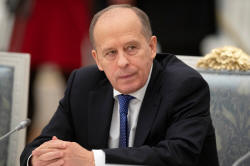|
FSB
chief Alexander Bortnikov said the security agency would follow
agreements reached by presidents Vladimir Putin and Joe Biden in
discussions about cybersecurity issues at a summit last week in
Switzerland, their first face-to-face meeting since Biden took
office in January.
"We will work together (on locating hackers) and hope for
reciprocity," the RIA news agency quoted Bortnikov as saying at
a security conference in Moscow.
Another senior official said Moscow was awaiting an answer from
Washington on holding consultations about cybersecurity issues,
TASS news agency reported.
Biden told Putin at the summit that certain critical
infrastructure should be "off-limits" to cyberattacks after
ransom-seeking cybercriminals briefly triggered the closure of a
major U.S. pipeline network, interrupting gasoline deliveries
and sparking panic-buying.
In some cases of hacking attacks, the United States has accused
those responsible of either working directly for the Russian
government or from Russian territory. The Kremlin has denied any
state involvement in the attacks.
Putin and Biden also agreed to embark on regular negotiations to
try to lay the groundwork for future arms control agreements and
risk-reduction measures.
In separate comments on Wednesday, Defence Minister Sergei
Shoigu said Moscow has called for measures to increase
transparency about the deployment of missiles in Europe.
Shoigu said Putin had proposed measures such as a moratorium on
the deployment of intermediate- and short-range missiles in
Europe to build mutual trust.
"The situation in Europe is overall explosive, which requires
concrete steps to be taken for its de-escalation," Shoigu said.
"We are ready to work towards this."
Putin has accused NATO of dismissing Russian proposals to reduce
tensions and the risk of military incidents.
Russia's relations with the West are languishing at post-Cold
War lows, strained by issues ranging from Moscow's 2014
annexation of Crimea to the conflict in Syria and allegations of
Russian hacking of U.S. elections.
(Reporting by Maria Kiselyova and Tom BalmforthWriting by Olzhas
Auyezov/Gabrielle Tétrault-Farber; Editing by Mark Heinrich)
[© 2021 Thomson Reuters. All rights
reserved.] Copyright 2021 Reuters. All rights reserved. This material may not be published,
broadcast, rewritten or redistributed.
Thompson Reuters is solely responsible for this content.

|
|





